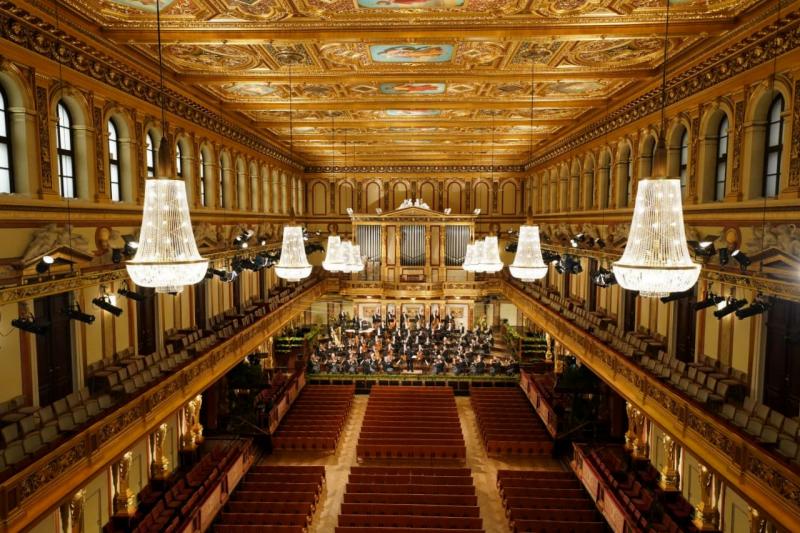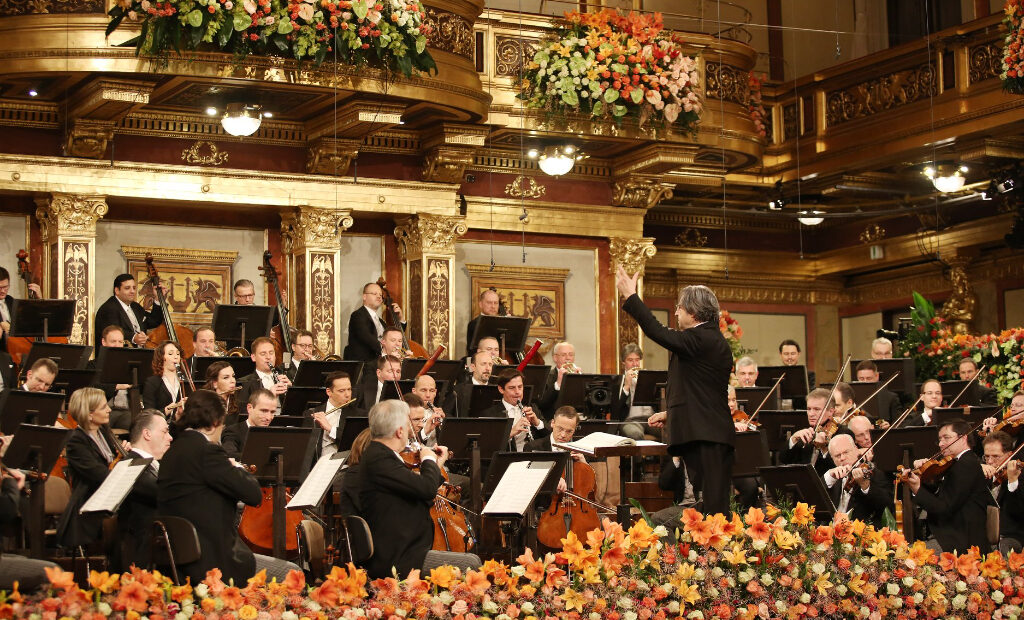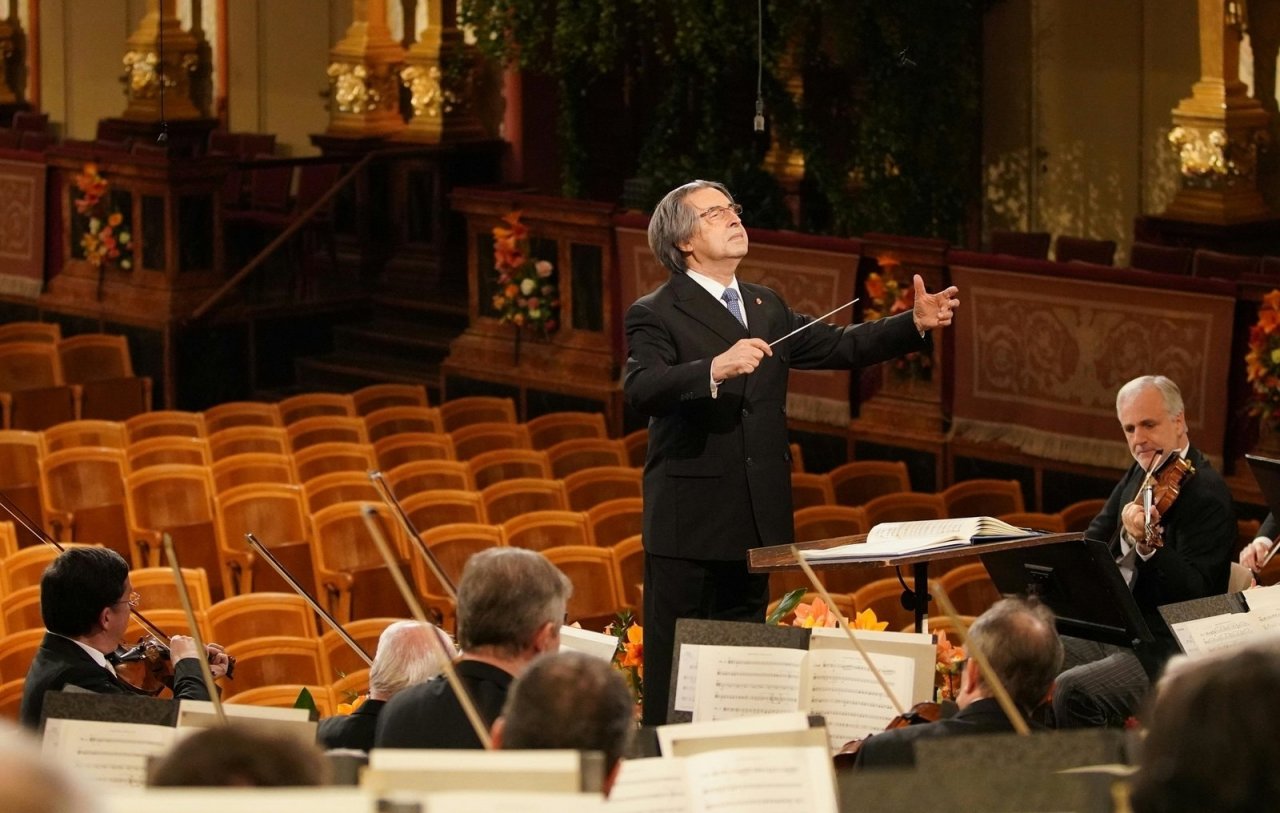Vienna New Year’s Day Concert, BBC Two/Radio 3 review - noble integrity and missionary zeal | reviews, news & interviews
Vienna New Year’s Day Concert, BBC Two/Radio 3 review - noble integrity and missionary zeal
Vienna New Year’s Day Concert, BBC Two/Radio 3 review - noble integrity and missionary zeal
Riccardo Muti brings aristocratic melancholy to a surprisingly moving, audienceless ritual

“Without a care” (Ohne Sorgen, the title of a fast polka by Josef Strauss performed here with deadpan sung laughs from the players) was never going to be the motto of a Vienna Philharmonic concert without an audience. Introspection and even sadness seemed frequent companions in the interesting New Year’s Day bill of fare.
It sounded as if there were spacing-out on the platform. When I watched the whole thing later on BBC Two, that turned out not to be the case; unlike in the UK, string players were even sharing stands. How so? Because they are all Covid-tested every day. But why do, or watch, a New Year’s Day Concert without the give-and-take of orchestra and audience (top price, had there been one, 1200 Euros)? From my perspective, because an Austrian orchestra featuring players from all over the world, and conducted by an Italian, seemed like essential viewing and listening on the morning after the UK’s wretched departure from the European Union. Vienna-centric Franz von Suppe, whose Fatinitza March opened the first half and his Poet and Peasant Overture, much of it sounding like early Verdi, the second, was Dalmatian (for which now read Croatian) born, Belgian and Italian by descent.  Inevitably in part a showcase for the conservative, tradition-oriented side of the Austrians, with its nostalgia for k.k./k.u.k imperialism, the event in this of all years became something bigger. As Muti put it in a moving speech before the traditional New Year greeting from the whole orchestra, music is not mere entertainment or a profession, but a mission, to make society better. Would all political leaders around the world take note, he asked? We’ll see.
Inevitably in part a showcase for the conservative, tradition-oriented side of the Austrians, with its nostalgia for k.k./k.u.k imperialism, the event in this of all years became something bigger. As Muti put it in a moving speech before the traditional New Year greeting from the whole orchestra, music is not mere entertainment or a profession, but a mission, to make society better. Would all political leaders around the world take note, he asked? We’ll see.
Muti was also right to talk about the “joy and sadness, life and death” even in a work as familiar as On the Beautiful Blue Danube. After that speech, this, the traditional encore, began as a new dawn (the misty prelude with the horns prefiguring the melody), while careful dynamics and ritenutos brought out more pathos than I’ve ever heard in the waltz. Same, too, for the main strain in the Emperor Waltz, at odds with the kitsch accoutrements of the imperial apartments shown as part of the visual publicity for the city.
At least we also got the background of the Loos Haus (astonishingly modern for 1910-11) for the first of the conventional appearances by dancers from the Vienna Opera Ballet, filmed in late summer when the house came briefly out of lockdown and admitted audiences. It would have been amusing to have an Esther Williams-style water ballet in the 1920s thermal baths of Baden bei Wien to accompany the brash, fun Girls of Baden Waltz with its saucy-prancings opening, by Bohemian-born Karel Komzák the Younger (1850-1905 - ever heard of him? I hadn’t). As it was, we just got pretty footage of the spa town, not to be confused with Baden-Baden in Germany; next time the BBC’s Petroc Trelawny manages to get to Vienna for his annual presentation, he needs to take the long tram journey there for an out of season visit.  Other rarities on the programme, good for Viennese-music trainspotters but worthwhile in their own right, were Zeller’s attractive Grubenlichter Waltz – allowing Trelawny to hint at his Cornish roots, since the light/lamp in question was invented by Penzance-born Humphry Davy, Millöcker’s In Saus und Braus (“Living It Up”) Galop, Josef Strauss’s Niko Polka – composed for Pavlovsk outside St Petersburg, with a dark Russian folk-strain and a quiet ending – and J Strauss II’s New Melodies Quadrille (name the Italian opera transformations – I got nine). Novelty noises were kept to a minimum, for the good reason of yielding no audience laughs, but it’s always a pleasure to hear the cuckoo in the Im Krapfenwald’l Polka, with his naughty upside down ‘oo-cuck” come the refrain.
Other rarities on the programme, good for Viennese-music trainspotters but worthwhile in their own right, were Zeller’s attractive Grubenlichter Waltz – allowing Trelawny to hint at his Cornish roots, since the light/lamp in question was invented by Penzance-born Humphry Davy, Millöcker’s In Saus und Braus (“Living It Up”) Galop, Josef Strauss’s Niko Polka – composed for Pavlovsk outside St Petersburg, with a dark Russian folk-strain and a quiet ending – and J Strauss II’s New Melodies Quadrille (name the Italian opera transformations – I got nine). Novelty noises were kept to a minimum, for the good reason of yielding no audience laughs, but it’s always a pleasure to hear the cuckoo in the Im Krapfenwald’l Polka, with his naughty upside down ‘oo-cuck” come the refrain.
It was a pleasure, too, to hear the Radetzky March without the awful attempts at clapping along - and the Blue Danube introduction without the knowing ripple of applause that usually greets it. Applause nevertheless flooded in at both official ends of the uneven halves, relayed to the musicians through speakers in the Musikverein, from the 90 countries getting the livestream. Muti got his splendid results with an ethos of "less is more" - not everything needed to be conducted, and there were only a few attempts at podium jollity, not his natural sphere. It looked traditionally delicious as ever, with flowers provided by Vienna’s municipality park-keepers, and - contrary what the above image suggests -more women in the orchestra than before, including four vivaciously responsive first violinists on the back desk. Still, I’ll fully remove my hat when they finally invite Lithuanian Tanzmeisterin Mirga Gražinytė-Tyla to conduct.
rating
Explore topics
Share this article
Add comment
The future of Arts Journalism
You can stop theartsdesk.com closing!
We urgently need financing to survive. Our fundraising drive has thus far raised £49,000 but we need to reach £100,000 or we will be forced to close. Please contribute here: https://gofund.me/c3f6033d
And if you can forward this information to anyone who might assist, we’d be grateful.

Subscribe to theartsdesk.com
Thank you for continuing to read our work on theartsdesk.com. For unlimited access to every article in its entirety, including our archive of more than 15,000 pieces, we're asking for £5 per month or £40 per year. We feel it's a very good deal, and hope you do too.
To take a subscription now simply click here.
And if you're looking for that extra gift for a friend or family member, why not treat them to a theartsdesk.com gift subscription?
more Classical music
 Bizet in 150th anniversary year: rich and rare French offerings from Palazzetto Bru Zane
Specialists in French romantic music unveil a treasure trove both live and on disc
Bizet in 150th anniversary year: rich and rare French offerings from Palazzetto Bru Zane
Specialists in French romantic music unveil a treasure trove both live and on disc
 Scottish Chamber Orchestra, Ibragimova, Queen’s Hall, Edinburgh review - rarities, novelties and drumrolls
A pity the SCO didn't pick a better showcase for a shining guest artist
Scottish Chamber Orchestra, Ibragimova, Queen’s Hall, Edinburgh review - rarities, novelties and drumrolls
A pity the SCO didn't pick a better showcase for a shining guest artist
 Kilsby, Parkes, Sinfonia of London, Wilson, Barbican review - string things zing and sing in expert hands
British masterpieces for strings plus other-worldly tenor and horn - and a muscular rarity
Kilsby, Parkes, Sinfonia of London, Wilson, Barbican review - string things zing and sing in expert hands
British masterpieces for strings plus other-worldly tenor and horn - and a muscular rarity
 From Historical to Hip-Hop, Classically Black Music Festival, Kings Place review - a cluster of impressive stars for the future
From quasi-Mozartian elegance to the gritty humour of a kitchen inspection
From Historical to Hip-Hop, Classically Black Music Festival, Kings Place review - a cluster of impressive stars for the future
From quasi-Mozartian elegance to the gritty humour of a kitchen inspection
 Shibe, LSO, Adès, Barbican review - gaudy and glorious new music alongside serene Sibelius
Adès’s passion makes persuasive case for the music he loves, both new and old
Shibe, LSO, Adès, Barbican review - gaudy and glorious new music alongside serene Sibelius
Adès’s passion makes persuasive case for the music he loves, both new and old
 Anja Mittermüller, Richard Fu, Wigmore Hall review - a glorious hall debut
The Austrian mezzo shines - at the age of 22
Anja Mittermüller, Richard Fu, Wigmore Hall review - a glorious hall debut
The Austrian mezzo shines - at the age of 22
 First Person: clarinettist Oliver Pashley on the new horizons of The Hermes Experiment's latest album
Compositions by members of this unusual quartet feature for the first time
First Person: clarinettist Oliver Pashley on the new horizons of The Hermes Experiment's latest album
Compositions by members of this unusual quartet feature for the first time
 Gesualdo Passione, Les Arts Florissants, Amala Dior Company, Barbican review - inspired collaboration excavates the music's humanity
At times it was like watching an anarchic religious procession
Gesualdo Passione, Les Arts Florissants, Amala Dior Company, Barbican review - inspired collaboration excavates the music's humanity
At times it was like watching an anarchic religious procession
 Classical CDs: Camels, concrete and cabaret
An influential American composer's 90th birthday box, plus British piano concertos and a father-and-son duo
Classical CDs: Camels, concrete and cabaret
An influential American composer's 90th birthday box, plus British piano concertos and a father-and-son duo
 Cockerham, Manchester Camerata, Sheen, Martin Harris Centre, Manchester review - re-enacting the dawn of modernism
Two UK premieres added to three miniatures from a seminal event of January 1914
Cockerham, Manchester Camerata, Sheen, Martin Harris Centre, Manchester review - re-enacting the dawn of modernism
Two UK premieres added to three miniatures from a seminal event of January 1914
 Kempf, Brno Philharmonic, Davies, Bridgewater Hall, Manchester review - European tradition meets American jazz
Bouncing Czechs enjoy their Gershwin and Brubeck alongside Janáček and Dvořák
Kempf, Brno Philharmonic, Davies, Bridgewater Hall, Manchester review - European tradition meets American jazz
Bouncing Czechs enjoy their Gershwin and Brubeck alongside Janáček and Dvořák
 Solomon, OAE, Butt, QEH review - daft Biblical whitewashing with great choruses
Even a top soprano and mezzo can’t make this Handel paean wholly convincing
Solomon, OAE, Butt, QEH review - daft Biblical whitewashing with great choruses
Even a top soprano and mezzo can’t make this Handel paean wholly convincing

Comments
Actually, if and when the VPO
Maybe in another 30 years;
Maybe in another 30 years; time, at the VPOs slow rate of evolution...Good Mozart opera isn't necessarily a guarantee of good dance conducting...
Sorry, under-caffeinated
Sorry, under-caffeinated morning key hitting (and not): years' and VPO's.
This is the worst New Year’s
I think you must be referring
I think you must be referring to the one that's just happened. This review is of a class act from Riccardo Muti at the beginning of LAST year. DIdn't watch this one - I have little respec for Franz Welser-Möst, the most overrated of conductors perceived as top-league.